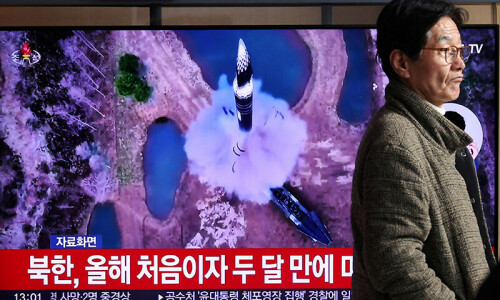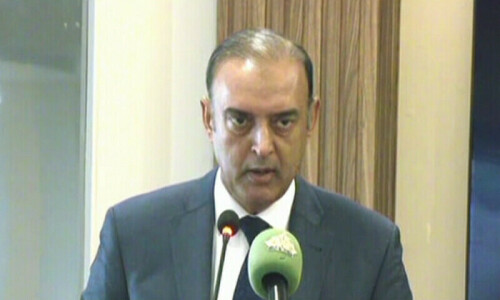• Justice Afridi says separate category to be created for cases where laws are challenged, or those that call for interpretation of Constitution
• Justice Shah won’t join special benches until full court decides validity of practice & procedure ordinance
• CJP Isa retires today, will attend full court reference, luncheon hosted by successor
ISLAMABAD: In line with the 26th Amendment that entailed the formation of constitutional benches to hear cases involving constitutional matters, Chief Justice-Designate Yayha Afridi on Thursday said a separate category would be created for cases where any law had been challenged or needed constitutional interpretation.
On the other hand, Justice Mansoor Ali Shah, who was supposed to become the top judge in line with the seniority principle, once again sought a full court meeting to determine the constitutional validity of a recent ordinance that amended the Supreme Court Practice and Procedure Act 2023.
During the hearing of a case relating to the right of pre-emption (Shufa) by a three-member bench, Justice Afridi disclosed the registrar’s office had been instructed to follow a certain policy regarding the transfer of pending cases to the constitutional bench to be formed under the 26th Amendment.
During the hearing, Justice Shahid Waheed observed that the present case should be heard by the constitutional bench since it required constitutional interpretation. Senior counsel Salman Aslam Butt endorsed the view, saying he did not want to say that but it was the right approach. At this Justice Afridi observed that he had directed the registrar to create a separate category for such cases and then they would be transferred as needed.
A number of Supreme Court benches, for the last few days, have been transferring cases to the constitutional benches for their final hearing.
Under the amendment, all cases that required constitutional interpretation or filed under Article 184(3) of the Constitution would be heard by a constitution bench consisting of five judges to be nominated after the new CJP takes oath on Oct 26.
Practice & Procedure law
In a second letter to outgoing CJP Qazi Faez Isa, Justice Syed Mansoor Ali Shah, who is on ex-Pakistan leave to perform Umrah, explained he did not become part of the bench hearing a tax matter because of the ordinance that changed rules regarding the bench-formation committee.
Justice Mansoor in his letter to the CJP, who heads the three-judge committee constituted under the Supreme Court (Practice and Procedure) Act 2023, said for the reasons recorded in the Sept 23 letter sent to the committee secretary, the contents of which despite requests were not recorded in the minutes of the 19th meeting of the committee, he could not be a part of the bench.
The judge said he would not participate in special benches formed by the new committee until the validity of the ordinance was determined by the full court or the earlier version of the committee — that included the three senior-most judges — was restored. It may be noted that following the ordinance, CJP Isa removed Justice Munib Akhtar from the committee and added Justice Aminuddin to it.
Justice Mansoor said he would only attend sittings of regular benches to hear the cases of ordinary litigants in the larger public interest. For these reasons, he disassociated himself from the bench, the letter said.
The senior puisne judge also quoted from ‘A Man for all Seasons’ where Sir Thomas More said: “I think that when statesmen forsake their own private conscience for the sake of their public duties, they lead their country by a short route to chaos.” “We often forget, when in power, people of this country are watching our actions and that history never forgives,” Justice Shah reminded.
Full court reference for CJP Isa
On his last working day, the outgoing chief justice, Qazi Faez Isa, heard a case related to the felling of 218 trees in Khyber Pakhtunkhwa.
In his remarks, the outgoing CJP appreciated that like a few countries in the world, the Constitution now included a reference to environmental protection.
Article 9A of the Constitution inserted through the 26th Amendment ensured that every person would be entitled to a clean, healthy and sustainable environment, he added.
Justice Naeem Akhtar Afghan and Justice Shahid Bilal were also members of the three-judge bench. CJP Isa remarked that due to pollution, some cities were becoming unliveable.
After attending the full court reference today, CJP Isa will also attend a luncheon reception being hosted by CJ-designate Justice Afridi on the Supreme Court premises.
It may be noted that the CJP had already declined a dinner arranged by the Supreme Court at government expense, saying the dinner would have cost the nation Rs2 million.
Published in Dawn, October 25th, 2024















































Dear visitor, the comments section is undergoing an overhaul and will return soon.